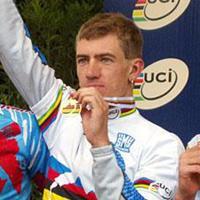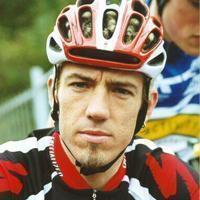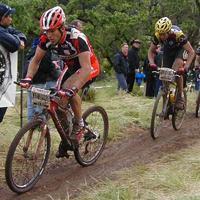
Recently on Cyclingnews.com |
Meirhaeghe to take a break - for a month or so
Belgium's current world cross-country champion plans to give 'cross and track a miss this year, he tells Gerard Knapp.
 |
As the cycling world awaited the start of the elite men's road race of the 2003 World Road Championships in Hamilton, Canada, the reigning world champion in the dirt track equivalent - Belgium's Filip Meirhaeghe - liked to think that his countryman Dave Bruylandts was a good chance for the podium of arguably the most important one-day race in road cycling.
But with the weight of the Belgian cycling press backing the roadie with the Marlux team, Meirhaeghe felt that Bruylandts may not handle the attention and pressure of carrying his country's hopes into such an important race.
Meirhaeghe should know. As one of the world's most consistent cross-country MTB racers, he had carried the hopes of his country into many events and onto many podiums, but always only the second or third step in the really important one-day races for mountain bikers.
|
“ I have a very competitive mind and this month, without any racing, I feel better without it. ” |
After a silver to Miguel Martinez at the 2000 Olympics and a silver to Roland Green in last year's epic world's mudfest in Kaprun, Austria, apart from other silvers and bronzes, the affable Belgian had come heartbreakingly close, yet never given up.
Finally this year, he won the gold in the men's cross country race at the world championships in Lugano, Switzerland in convincing fashion. It was a victory most deserved to one of the sport's most versatile and talented riders.
A relaxed Meirhaeghe was speaking under the awning of the Specialized caravan at the 'dirt demo' - the outdoor component of the USA's major Interbike convention in Las Vegas. Amid the dust, constant stream of bikes being wheeled out for demo rides, not to mention Limp Bizkit blaring out from the loudspeakers on the adjacent exhibitor's tent (this was largely a MTB day after all), the Belgian world cross-country champion was enjoying his short stay in the USA. He'd even taken some of sponsor's employees for a short ride (one called it a lesson) along some of the trails in Boulder Canyon as he was planning to kick back - to use local parlance - and unlike in previous years, not do anything competitive for a month or two. For once there was to be no cyclo-cross racing, or track racing.
Meirhaeghe is unique among elite cyclists in that he has competed at the highest levels in four disciplines of cycling - MTB, road, cyclo-cross and track. He's been a regular in Belgian cyclo-cross races and last year entered the Amsterdam Six Day track event, despite the belief by one or two senior track cycling figures that he wouldn't make it. He did, and teamed up with countryman Lorenzo Lapage to finish the six days of racing inside the smoky Amsterdam velodrome.
But his body was giving him a message - take it easy. "Last year, I knew it was on the limit, so it felt best to not tempt fate; is that the right way to say that?" Meirhaeghe asked in perfect English. The "it" he refers to is a troublesome right knee, the result of a particularly bad fall during some downhill racing (okay, make that five disciplines of competitive cycling) which by the end of the season started to create more than just discomfort.
He felt that last year's stint on the fixed gear track bike, with its compact and fixed position, higher leg-speed and shorter cranks, gave him the message that his 32 year-old joint needed a rest.
With the rainbow stripes of the world champion forever stitched into his race jerseys, Meirhaeghe's competitive spirit could also allow him to rest easy for a month or so.
 |
While admitting "I needed a break, mentally", Meirhaeghe feels it is not so much the feeling of accomplishment which has seen him take a break from other forms of racing, rather, it's all part of the plan for next year - the 2004 Athens Olympics.
Next month, Meirhaeghe will head off to Pretoria in South Africa for training and team bonding with many other members of the Belgian Olympic squad. This is part of a plan the Belgians used prior to the Sydney Olympics, where most of the athletes under consideration for selection - as few are yet guaranteed a place - are invited to attend a low-pressure training camp. The athletes can attend to their individual training needs in the mornings, while in the afternoons they form teams to play volleyball, basketball, soccer, or anything else on the agenda.
"I did it the year before Sydney and it worked really well," he said. "We do a lot of different sports and we get to know more about the other athletes." The atmosphere is not so much about pure competition, rather it's like a "family" where the aim is to get to know the other athletes and learn about their sports.
Trials and tribulations
To be Belgium's first world champion in ultra-competitive cross-country racing - and to be able to race in other disciplines at the highest level - has helped mountain biking move beyond its "little brother" status in his home country.
In a country where Eddy Merckx is revered, MTB racing was seen as somewhat less important to the skinny-tyre disciplines. But Meirhaeghe's efforts and those of his former contemporaries, such as MTB graduates Cadel Evans and Michael Rasmussen now riding Grand Tours at the front of the peloton in the mountains, has helped the sport's credentials.
Meirhaeghe became interested in mountain biking largely because none of his family was involved in road or track cycling. Rather, his family's passion is motorcycle trials, where the objective is not speed, but balance and skill as riders negotiate a parcours that is always over extremely difficult terrain. Points are deducted for putting feet down and other minor indiscretions. Motorcycling hacks call it "the violin of the sport".
In 1987 he first hit the dirt on a knobby-shod bicycle and shortly after, began his practice of using cyclo-cross and road racing to prepare for the MTB season. Growing up in Gent, he also had ready access to a beautiful timber velodrome and coaching support, so winters could still be fruitfully spent on two wheels.
 |
Even as an accomplished MTB racer, Meirhaeghe was still learning new skills, such as the hand-slings and tactics of the Madison, all the time spinning his legs. "We were able to ride fixed gear bikes in Gent in the winter," he said of growing up in the cycling-mad town. "But it was only four or five years ago that I was taught the skills of the Americain. I was motivated to learn it and of course, in the Six Day race, I learned a lot more, racing with Lorenzo Lapage."
(In the Amsterdam Six Day, it's worth noting that while they were off the pace in an event dominated by the Martinellos, Villas and Gilmores of the track world, the Belgian duo did finish, and not in last place.)
"But this winter I said I wouldn't do any competitions. Ever since I started to race I was always looking for another race, but now I need a break, mentally.
"I have a very competitive mind and this month, without any racing, I feel better without it," he said.
There were other factors coming into play, as Meirhaeghe's presence in cyclocross-mad Belgium would see most other competitors out to beat the MTB champion, with some taking the opportunity to make unflattering remarks if he finished in the bunch, so to speak.
"In Belgium, people would always expect something. I would do it [off-season racing] to keep my mind busy, but every now and then I would get comments. I thought 'I don't need this, it's not necessary, I'm just training'. I don't need to prove anything."
(Part 2 of this interview will be published later this week, where Filip talks about Athens 2004, why he won't be making the transition to fulltime road cycling and the camaraderie among MTB racers. )
Other Filip Meirhaeghe appearances on Cyclingnews
2003 World MTB championships
Previous interview this
year by Lucy Power
Other Talking Cycling Interviews
